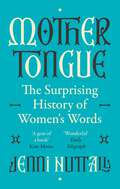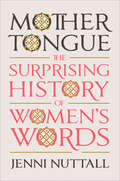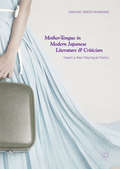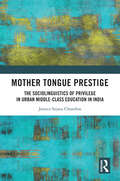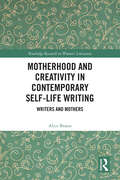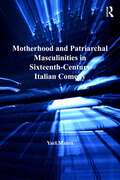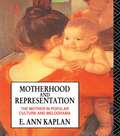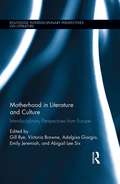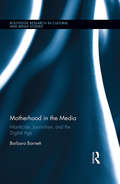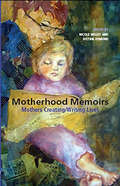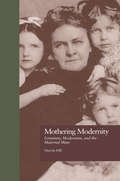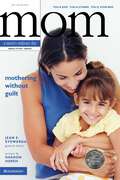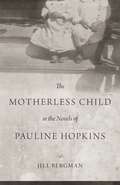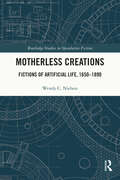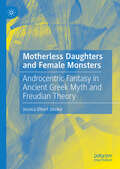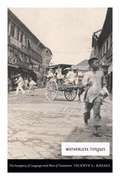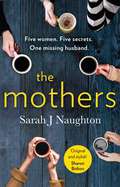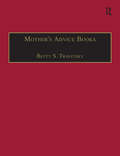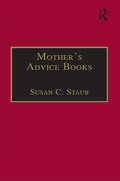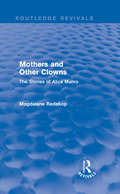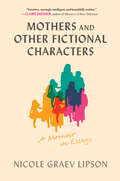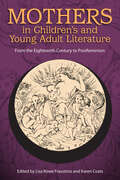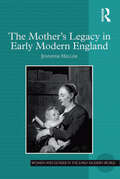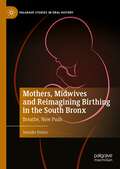- Table View
- List View
Mother Tongue: The surprising history of women's words -'Fascinating, intriguing, witty, a gem of a book' (Kate Mosse)
by Jenni NuttallA rich, provocative and entertaining history of women's words - of the language we have, and haven't, had to share our lives.'Fascinating, intriguing, witty, a gem of a book' KATE MOSSE'Full of interesting observations ... Entertaining' PHILIP HENSHER, SPECTATOR'This superb book teems with historical marvels and their 21st century resonances.' REBECCA WRAGG SYKES, author of KindredSo many of the words we use to articulate the experiences women share feel awkward or alien. Medical terms are accurate but antiseptic. Slang often perpetuates stereotypes. Where are the plain, honest words for women's daily lives? From the dawn of Old English to the present day, Dr. Jenni Nuttall guides readers through the evolution of the words we have used to describe bodies, menstruation, sexuality, the consequences of male violence, childbirth, paid and unpaid work, and gender.Along the way, she argues that, paradoxically, as women have made slow progress towards equality, we've lost some of the most expressive and eloquent bits of our vocabulary. Inspired by Nuttall's deep knowledge of the English language as well as conversations with her teenage daughter, this is a book for anyone who loves language - and for feminists who want to look to the past in order to move forward.'There is a nugget of joy and wisdom on every single page' VICTORIA WHITWORTH, historian and author of Daughter of the Wolf
Mother Tongue: The Surprising History of Women's Words
by Jenni Nuttall&“A fascinating look at how we talk about women. . . . Dense with information and anecdotes, Mother Tongue touches on the hilarious and the devastating, with ample dashes of an ingredient so painfully absent from most discussions of sex and gender: humor.&” ―Lisa Selin Davis, The Washington Post &“[Nuttall] examines the origins of words used over many centuries to describe women&’s bodies, desires, pregnancies, work lives, sexual victimhood, and stages of life. . . . Her research is comprehensive enough that even longtime word enthusiasts will find plenty of new trivia.&” ―The New YorkerAn enlightening linguistic journey through a thousand years of feminist language—and what we can learn from the vivid vocabulary that English once had for women&’s bodies, experiences, and sexualitySo many of the words that we use to chronicle women&’s lives feel awkward or alien. Medical terms are scrupulously accurate but antiseptic. Slang and obscenities have shock value, yet they perpetuate taboos. Where are the plain, honest words for women&’s daily lives?Mother Tongue is a historical investigation of feminist language and thought, from the dawn of Old English to the present day. Dr. Jenni Nuttall guides readers through the evolution of words that we have used to describe female bodies, menstruation, women&’s sexuality, the consequences of male violence, childbirth, women&’s paid and unpaid work, and gender. Along the way, she challenges our modern language&’s ability to insightfully articulate women&’s shared experiences by examining the long-forgotten words once used in English for female sexual and reproductive organs. Nuttall also tells the story of words like womb and breast, whose meanings have changed over time, as well as how anatomical words such as hysteria and hysterical came to have such loaded legacies.Inspired by today&’s heated debates about words like womxn and menstruators—and by more personal conversations with her teenage daughter—Nuttall describes the profound transformations of the English language. In the process, she unearths some surprisingly progressive thinking that challenges our assumptions about the past—and, in some cases, puts our twenty-first-century society to shame. Mother Tongue is a rich, provocative book for anyone who loves language—and for feminists who want to look to the past in order to move forward.
Mother-Tongue in Modern Japanese Literature and Criticism: Toward a New Polylingual Poetics
by Takayuki Yokota-MurakamiThis book examines how early research on literary activities outside national literatures such as émigré literature or diasporic literature conceived of the loss of ‘mother-tongue” as a tragedy, and how it perpetuated the ideology of national language by relying on the dichotomy of native language/foreign language. It transcends these limitations by examining modern Japanese literature and literary criticism through modern philology, the vernacularization movement, and Korean-Japanese literature. Through the insights of recent philosophical/linguistic theories, it reveals the political problems of the notion of “mother-tongue” in literary and linguistic theories and proposes strategies to realize genuinely “exophonic” and “translational” literature beyond the confines of nation. Examining the notion of “mother-tongue” in literature and literary criticism, the author deconstructs the concept and language itself as an apparatus of nation-state in order to imagine alternative literature, genuinely creolized and heterogeneous. Offering a comparative, transnational perspective on the significance of the mother tongue in contemporary literatures, this is a key read for students of modern Japanese literature, language and culture, as well as those interested in theories of translation and bilingualism.
Mother Tongue Prestige: The Sociolinguistics of Privilege in Urban Middle-Class Education in India
by Jessica Sujata ChandrasThis book studies the intersection of language and social privilege in education in India. Drawing on rich ethnographic detail and primary data, it introduces a conversation of privilege, specifically contemporary configurations of caste and socioeconomic class in India, to the fields of South Asian studies and sociolinguistic educational studies. The author examines how and why education at the pre-primary, secondary, and higher education levels in India remains largely segregated by socioeconomic class and caste through the lens of language. She advances fields of study of multilingual education, language ideologies, and complexities between language and identity to contribute to work on language and privilege in education by providing a novel and contemporary case from India. The book also critiques contemporary caste configurations in India that uphold urban middle-class Brahmins as the socially privileged purveyors of social and linguistic norms. Mother Tongue Prestige parses out threads of motivation, perceptions of education, and aspirations tied to language use and learning that shape generations of students in an educational system preparing them for a globalized workforce and urban, multilingual livelihoods in India and abroad. It will be indispensable for students and researchers of education, language, sociology, sociology of education, linguistics, sociolinguistics, South Asian studies.
Motherhood and Creativity in Contemporary Self-Life Writing: Writers and Mothers (Routledge Research in Women's Literature)
by Alice BraunThis book aims to study the representation of motherhood in self-life writing by English-speaking authors. It highlights the particular issues women writers are faced with when they try to combine their vocation as artists with their duties to their children. For those women who claim their right to be both mothers and writers, several cultural myths need to be taken down, chief among which is the representations that we have of what being an artist should be like, as well as the role a mother should have towards her children. This book looks at self-life writing by women from English-speaking countries to reveal the common themes and tropes which recur in texts written on the subject of motherhood, by looking at them from both a literary and a cultural perspective. It also aims to demonstrate that a new generation of women writers is taking up the subject and forging a new literary tradition.
Motherhood and Patriarchal Masculinities in Sixteenth-Century Italian Comedy
by Yael ManesExploring individual and collective formation of gender identities, this book contributes to current scholarly discourses by examining plays in the genre of 'erudite comedy' (commedia erudita), which was extremely popular among sixteenth-century Italians from the elite classes. Author Yael Manes investigates five erudite comedies-Ludovico Ariosto's I suppositi (1509), Niccolò Machiavelli's La Mandragola (1518) and Clizia (1525), Antonio Landi's Il commodo (1539), and Giovan Maria Cecchi's La stiava (1546)-to consider how erudite comedies functioned as ideological battlefields where the gender system of patriarchy was examined, negotiated, and critiqued. These plays reflect the patriarchal order of their elite social milieu, but they also offer a unique critical vantage point on the paradoxical formation of patriarchal masculinity. On the one hand, patriarchal ideology rejects the mother and forbids her as an object of desire; on the other hand, patriarchal male identity revolves around representations of motherhood. Ultimately, the comedies reflect the desire of the Italian Renaissance male elite for women who will provide children to their husbands but not actively assume the role of a mother. In sum, Manes reveals a wide cultural understanding that motherhood-as an activity that women undertake, not simply a relational position they occupy-challenges patriarchy because it bestows women with agency, power, and authority. Manes here recovers the complexity of Renaissance Italian discourse on gender and identity formation by approaching erudite comedies not only as mirrors of their audiences but also as vehicles for contemporary audiences' ideological, psychological, and emotional expressions.
Motherhood and Representation: The Mother in Popular Culture and Melodrama
by E. Ann KaplanFrom novels of the nineteenth century to films of the 1990s, American culture, abounds with images of white, middle-class mothers. In Motherhood and Representation, E. Ann Kaplan considers how the mother appears in three related spheres: the historical, in which she charts changing representations of the mother from 1830 to the postmodernist present; the psychoanalytic, which discusses theories of the mother from Freud to Lacan and the French Feminists; and the mother as she is figured in cultural representations: in literary and film texts such as East Lynne, Marnie and the The Handmaid's Tale, as well as in journalism and popular manuals on motherhood. Kaplan's analysis identifies two dominant paradigms of the mother as `Angel' and `Witch', and charts the contesting and often contradictory discourses of the mother in present-day America.
Motherhood in Literature and Culture: Interdisciplinary Perspectives from Europe (Routledge Interdisciplinary Perspectives on Literature)
by Gill Rye Victoria Browne Adalgisa Giorgio Emily Jeremiah Abigail Lee SixMotherhood remains a complex and contested issue in feminist research as well as public discussion. This interdisciplinary volume explores cultural representations of motherhood in various contemporary European contexts, including France, Italy, Germany, Portugal, Spain, and the UK, and it considers how such representations affect the ways in which different individuals and groups negotiate motherhood as both institution and lived experience. It has a particular focus on literature, but it also includes essays that examine representations of motherhood in philosophy, art, social policy, and film. The book’s driving contention is that, through intersecting with other fields and disciplines, literature and the study of literature have an important role to play in nuancing dialogues around motherhood, by offering challenging insights and imaginative responses to complex problems and experiences. This is demonstrated throughout the volume, which covers a range of topics including: discursive and visual depictions of pregnancy and birth; the impact of new reproductive technologies on changing family configurations; the relationship between mothering and citizenship; the shaping of policy imperatives regarding mothering and disability; and the difficult realities of miscarriage, child death, violence, and infanticide. The collection expands and complicates hegemonic notions of motherhood, as the authors map and analyse shifting conceptions of maternal subjectivity and embodiment, explore some of the constraining and/or enabling contexts in which mothering takes place, and ask searching questions about what it means to be a ‘mother’ in Europe today. It will be of interest not only to those working in gender, women’s and feminist studies, but also to scholars in literary and cultural studies, and those researching in sociology, criminology, politics, psychology, medical ethics, midwifery, and related fields.
Motherhood in the Media: Infanticide, Journalism, and the Digital Age (Routledge Research in Cultural and Media Studies)
by Barbara BarnettThis book examines contemporary media stories about women who kill their children. By analyzing media texts, motherhood blogs, and journalistic interviews, the book seeks to understand better maternal violence and the factors that lead women to harm their children. The central thesis of this book is that media practices have changed dramatically during the past 50 years, as has society’s views on "appropriate" feminine behavior, yet definitions of characteristics of good mothers remain largely defined by 1950s sit coms, Victorian ideals, and Christian theology. The book contends that in spite of media saturation in American society, and the media’s increased opportunities to tell complex and nuanced stories, news media narratives continue to situate maternal violence as rare, unfathomable, and unpredictable. The news media’s shift in focus—from public service to profit-making industry—has encouraged superficial coverage of maternal violence as reporters look for stories that sell, not stories that explain. Motherhood blogs, in contrast, offer an opportunity for women to tell their own stories about motherhood, based on experience. Interviews with journalists offer insights into how the structure of their jobs dictates media coverage of this intimate form of violence.
Motherhood Memoirs: Mothers Creating/writing Lives
by Justine DymondThe authors in this collection examine and critique motherhood memoir, alongside the texts of their own lives, while seeking to transform mothering practice— highlighting revolutionary praxis within books, or, when none is available, creating new visions for social change. Many essays interrogate the tensions of maternal narrative—the negotiation of the historical location of writer and readers, narrative and linguistic constraints, and the slippery ground of memory—as well as the borders constructed between the “objective” scholar and the reader who engages with and identifies with texts through her intellect and her emotional being.
Mothering Modernity: Feminism, Modernism, and the Maternal Muse (Origins of Modernism)
by Marylu HillFirst published in 1999. Routledge is an imprint of Taylor & Francis, an informa company.
Mothering Without Guilt: You and God, You and Others, You and Your Kids (A Mom's Ordinary Day Bible Study Series)
by Sharon A. HershA Bible study series addressing the unique needs of moms.These 8 Bible studies help women discover God’s wisdom on how to be the best mothers, women, and disciples they can be. Each study contains 6 sessions divided into 5 flexible portions: For You Alone, For You and God’s Word, For You and Others, For You and God, and For You and Your Kids. The last section helps moms share each week’s nugget of truth with their children.• Mothering without Guilt identifies and debunks the “perfect mom” stereotypes and encourages moms to be real—not perfect—and forgiven—not guilty.
The Motherless Child in the Novels of Pauline Hopkins
by Jill BergmanWell known in her day as a singer, playwright, author, and editor of the Colored American Magazine, Pauline Hopkins (1859--1930) has been the subject of considerable scholarly attention over the last twenty years. Academic review of her many accomplishments, however, largely overlooks Hopkins's contributions as novelist. The Motherless Child in the Novels of Pauline Hopkins, the first book-length study of Hopkins's major fiction, fills this gap, offering a sustained analysis of motherlessness in Contending Forces, Hagar's Daughter, Winona, and Of One Blood. Motherlessness appears in all of Hopkins's novels. The motif, Jill Bergman asserts, resonated profoundly for African Americans living with the legacy of abduction from a motherland and familial fragmentation under slavery. In her novels, motherlessness serves as a trope for the national alienation of post-Reconstruction African Americans. The longing and search for a maternal figure, then, represents an effort to reconnect with the absent mother -- a missing parent and a lost African history and heritage. In Hopkins's oeuvre, the image of the mother of African heritage -- a source of both identity and persecution -- becomes a source of power and possibility. Bergman shows how historical events -- such as Bleeding Kansas, the execution of John Brown, and the Middle Passage -- gave rise to a sense of motherlessness and how Hopkins's work engages with that of other contemporaneous race activists. This illuminating study opens new terrain not only in Hopkins scholarship, but also in the complex interchanges between literary, African American, psychoanalytic, feminist, and postcolonial studies.
Motherless Creations: Fictions of Artificial Life, 1650-1890 (Routledge Studies in Speculative Fiction)
by Wendy C. NielsenThis book explains the elimination of maternal characters in American, British, French, and German literature before 1890 by examining motherless creations: Pygmalion’s statue, Frankenstein’s creature, homunculi, automata, androids, golems, and steam men. These beings typify what is now called artificial life, living systems made through manufactured means. Fantasies about creating life ex-utero were built upon misconceptions about how life began, sustaining pseudoscientific beliefs about the birthing body. Physicians, inventors, and authors of literature imagined generating life without women to control the process of reproduction and generate perfect progeny. Thus, some speculative fiction before 1890 belongs to the literary genealogy of transhumanism, the belief that technology will someday transform some humans into superior, immortal beings. Female motherless creations tend to operate as sexual companions. Male ones often emerge as subaltern figures analogous to enslaved beings, illustrating that reproductive rights inform readers’ sense of who counts as human in fictions of artificial life.
Motherless Daughters and Female Monsters: Androcentric Fantasy in Ancient Greek Myth and Freudian Theory
by Jessica Elbert DeckerThis book is a feminist analysis of Greek myth and tragedy that reimagines the structures of Freudian theory. The objective of this analysis is political—by revealing the structures that undergird patriarchal oppression, feminist thinkers can work to transform these symbolic constellations through the work of sabotage, parody, and imagination. Jessica Elbert Decker attempts here to read Freudian theory through a wider lens of Ancient Greek culture, since our contemporary philosophical and social culture has inherited many of its symbolic structures (e.g., patriarchy, binary thinking). The major argument of the book is that our Western philosophical, social, and symbolic systems are, as they were in the Ancient Greek world, suffused with a set of values that reflect one version of masculinity and androcentrism, and that those values are destructive to human beings as well as the non-human world, including other beings.
Motherless Tongues: The Insurgency of Language amid Wars of Translation
by Vicente L. RafaelIn Motherless Tongues, Vicente L. Rafael examines the vexed relationship between language and history gleaned from the workings of translation in the Philippines, the United States, and beyond. Moving across a range of colonial and postcolonial settings, he demonstrates translation's agency in the making and understanding of events. These include nationalist efforts to vernacularize politics, U.S. projects to weaponize languages in wartime, and autobiographical attempts by area studies scholars to translate the otherness of their lives amid the Cold War. In all cases, translation is at war with itself, generating divergent effects. It deploys as well as distorts American English in counterinsurgency and colonial education, for example, just as it re-articulates European notions of sovereignty among Filipino revolutionaries in the nineteenth century and spurs the circulation of text messages in a civilian-driven coup in the twenty-first. Along the way, Rafael delineates the untranslatable that inheres in every act of translation, asking about the politics and ethics of uneven linguistic and semiotic exchanges. Mapping those moments where translation and historical imagination give rise to one another, Motherless Tongues shows how translation, in unleashing the insurgency of language, simultaneously sustains and subverts regimes of knowledge and relations of power.
The Mothers: Five women. Five secrets. One missing husband.
by Sarah J NaughtonFROM THE NUMBER ONE BESTSELLING AUTHOR'Dazzlingly inventive'Sunday Times, Crime Book of the Month'A meticulously plotted exploration of friendship, foe-ship and the lies that bind, which builds to a gripping and powerful conclusion'Cara Hunter********** FIVE WOMEN.They meet at their NCT Group. The only thing they have in common is they're all pregnant. FIVE SECRETS.Three years later, they are all good friends. Aren't they? ONE MISSING HUSBAND.Now the police have come knocking. Someone knows something. THE TROUBLE WITH SECRETS IS THAT SOMEONE ALWAYS TELLS...********** 'The perfect dose of thrills and suspense, this will keep you engrossed to the very end' Heat'Original and stylish... will keep you guessing to the last page'Sharon BoltonFor fans of Big Little Lies, The Rumour and I Invited Her In, this is first class psychological suspense from the critically acclaimed Sarah J Naughton.
The Mothers: Five women. Five secrets. One missing husband.
by Sarah J NaughtonFROM THE NUMBER ONE BESTSELLING AUTHOR'Dazzlingly inventive'Sunday Times, Crime Book of the Month'A meticulously plotted exploration of friendship, foe-ship and the lies that bind, which builds to a gripping and powerful conclusion'Cara Hunter********** FIVE WOMEN.They meet at their NCT Group. The only thing they have in common is they're all pregnant. FIVE SECRETS.Three years later, they are all good friends. Aren't they? ONE MISSING HUSBAND.Now the police have come knocking. Someone knows something. THE TROUBLE WITH SECRETS IS THAT SOMEONE ALWAYS TELLS...********** 'The perfect dose of thrills and suspense, this will keep you engrossed to the very end' Heat'Original and stylish... will keep you guessing to the last page'Sharon BoltonFor fans of Big Little Lies, The Rumour and I Invited Her In, this is first class psychological suspense from the critically acclaimed Sarah J Naughton.
Mother’s Advice Books: Printed Writings 1500–1640: Series I, Part Two, Volume 8 (The Early Modern Englishwoman: A Facsimile Library of Essential Works & Printed Writings, 1500-1640: Series I, Part Two #Vol. 8)
by Betty S. Travitsky and Patrick CullenEarly modern works of advice can be typified by a number of texts by Erasmus falling into a variety of categories: advice on family conduct; manners; study plans and piety. A close relation to these works of advice was the parental advice book, usually written by a father to his son. It was not until the early 17th century that the mother's advice book evolved and even then these were often legitimated by the female authors claiming that sickness, or even impending death, made relaying their motherly advice by a means other than print impossible. The contents of the present volume, ordered chronologically by the date of the first edition of each advice book, are limited to works attributed to named mothers, even though information about these historical women is not always abundant. Miscellanea was the attempt of Elizabeth Grymeston to distill advice to her only surviving. It was first published in 1604. The text reproduced here is the 1608 edition which was the first to include the additional substantive Prayers. Even though listings indicate there were 19 editions of The Mother’s Blessing before 1640 very little is known of Dorothy Leigh. The first edition (1616), reproduced here, describes her as a gentle-woman, not long deceased and her dedicatory epistle to her three sons identifies her as a widow. Elizabeth Clinton wrote her advice book when she had become countess-dowager. It was dedicated to her daughter-in-law and addresses an area where she had apparently been deficient - the imperative directed at early modern women by domestic conduct books that mothers should nurse their own children. The edition reproduced here is the British Library copy. Elizabeth Brook Joceline composed her Legacy whilst awaiting the birth of her first child, having become convinced that she would die in childbirth. She died in 1622, nine days after the birth of a daughter. Possibly the most poignant of the mother's advice books, this was intended to stand in for her instructi
Mother’s Advice Books: Printed Writings 1641–1700: Series II, Part One, Volume 3 (The Early Modern Englishwoman: A Facsimile Library of Essential Works & Printed Writings, 1641-1700: Series II, Part One #Vol. 3, Pt. 1)
by Susan C. StaubA form of courtesy literature, Mother's Advice Books were texts written by mothers to instruct their children in religious, educational, and occasionally wordly matters. The three texts included in this volume, Elizabeth Richardson's A Ladies Legacie to her Davghters, Susanna Bell's The Legacy of a Dying Mother To Her Mourning Children, and the unattributed The Mothers Blessing, offer interesting alternatives to the many published male views of the family from the period. Indeed, this volume features an appendix with two much shorter portions of predominantly male-authored texts: Mary Pennyman's letter to her children, published as part of John Pennyman's Instruction to his Children, and Elizabeth Walker's 'For my Dear Children, Mrs.Margaret Walker and Elizabeth Walker', included in Anthony Walker's The Holy Life of Mrs. Elizabeth Walker. The fact that these women were mothers gave them an authority to write that other women were not easily granted, and it is clear that many of these works were written with publication in mind. In addition to giving women public status as authors, these books also enabled them to enter political and religious debates under the guise of offering advice to their children. The Mother's Advice Book is, then, an intriguing genre that simultaneously violates and yet replicates early modern patriarchy.
Mothers and Other Clowns: The Stories of Alice Munro (Routledge Revivals)
by Magdalene RedekopFirst published in 1992, this is the first study of the work of Alice Munro to focus on her obsession with mothering, and to relate it to the hallucinatory quality of her magic realism. A bizarre collection of clowning mothers parade across the pages of Munro’s fiction, playing practical jokes, performing stunts, and dressing in disguises that recycle vintage literary images. Magdalene Redekop studies this with the aim of gaining increased understanding of Munro’s evolving comic vision.
Mothers and Other Fictional Characters: A Memoir in Essays
by Nicole Graev LipsonUSA Today Bestseller “Sensitive, searingly intelligent, and beautifully written.” —Claire Dederer, author of Monsters: A Fan’s Dilemma “This is—for real—a masterwork, one I will return to over and over." —Joanna Rakoff, author of My Salinger Year In this intimate and riveting memoir, Best American Essayist Nicole Graev Lipson breaks through the ready-made stories of womanhood, rescuing truth from the fiction that infiltrates our lives.What does it take to escape the plotlines mapped onto us? Searching for clues in the work of her literary foremothers, Lipson untangles what it means to be a girl, a woman, a lover, a partner, a daughter, and a mother in a world all too ready to reduce us to stock characters. Whether she’s testing the fragile borders of fidelity, embracing the taboo power of female friendship, escaping her family for the solitude of the mountains, grappling with what to do with her frozen embryos, or letting go of the children she imagined for the ones she’s raising, Lipson pushes beyond the easy, surface stories we tell about ourselves to brave less certain territory. As Lipson journeys through this thorny terrain, literature becomes her lodestar. Kate Chopin’s erotic story “The Storm” helps her reckon with the longings stirring below the surface of her marriage. Watching her son absorb the stifling codes of manhood, she finds unlikely parenting inspiration in Philip Roth’s most cartoonish overbearing mother. Summoning Gwendolyn Brooks, she asks, Can destroying one’s frozen embryos be understood as a maternal act? And accompanied by Shakespeare’s gender-bending heroine Rosalind, she seizes on the truest meaning of loving her oldest child. Risky and revealing, nourishing and affirming, rigorous and sexy, Mothers and Other Fictional Characters is a shimmering love letter to our forgotten selves—and the ones we’re still becoming.
Mothers in Children's and Young Adult Literature: From the Eighteenth Century to Postfeminism (Children's Literature Association Series)
by Lisa Rowe Fraustino and Karen CoatsWinner of the Children’s Literature Association’s 2018 Edited Book AwardContributions by Robin Calland, Lauren Causey, Karen Coats, Sara K. Day, Lisa Rowe Fraustino, Dorina K. Lazo Gilmore, Anna Katrina Gutierrez, Adrienne Kertzer, Kouen Kim, Alexandra Kotanko, Jennifer Mitchell, Mary Jeanette Moran, Julie Pfeiffer, and Donelle RuweLiving or dead, present or absent, sadly dysfunctional or merrily adequate, the figure of the mother bears enormous freight across a child's emotional and intellectual life. Given the vital role literary mothers play in books for young readers, it is remarkable how little scholarly attention has been paid to the representation of mothers outside of fairy tales and beyond studies of gender stereotypes. This collection of thirteen essays begins to fill a critical gap by bringing together a range of theoretical perspectives by a rich mix of senior scholars and new voices.Following an introduction in which the coeditors describe key trends in interdisciplinary scholarship, the book's first section focuses on the pedagogical roots of maternal influence in early children's literature. The next section explores the shifting cultural perspectives and subjectivities of the twentieth century. The third section examines the interplay of fantasy, reality, and the ethical dimensions of literary mothers. The collection ends with readings of postfeminist motherhood, from contemporary realism to dystopian fantasy.The range of critical approaches in this volume will provide multiple inroads for scholars to investigate richer readings of mothers in children's and young adult literature.
The Mother's Legacy in Early Modern England (Women And Gender In The Early Modern World Ser.)
by Jennifer HellerUsing printed and manuscript texts composed between 1575 and 1672, Jennifer Heller defines the genre of the mother's legacy as a distinct branch of the advice tradition in early modern England that takes the form of a dying mother's pious counsel to her children. Reading these texts in light of specific cultural contexts, social trends, and historical events, Heller explores how legacy writers used the genre to secure personal and family status, to shape their children's beliefs and behaviors, and to intervene in the period's tumultuous religious and political debates. The author's attention to the fine details of the period's religious and political swings, drawn from sources such as royal proclamations, sermons, and first-hand accounts of book-burnings, creates a fuller context for her analysis of the legacies. Similarly, Heller explains the appeal of the genre by connecting it to social factors including mortality rates and inheritance practices. Analyses of related genres, such as conduct books and fathers' legacies, highlight the unique features and functions of mothers' legacies. Heller also attends to the personal side of the genre, demonstrating that a writer's education, marriages, children, and turns of fortune affect her work within the genre.
Mothers, Midwives and Reimagining Birthing in the South Bronx: Breathe, Now Push (Palgrave Studies in Oral History)
by Jennifer DohrnWomen came through the doors at a community-based birthing center in the South Bronx seeking prenatal care. They had heard about the center from a neighbor, a parents' group at their children’s school, or the local mosque or church. What they found when they arrived was a brightly-colored waiting area that resembled a living room, children immersed in games in a corner, and staff that reflected the mosaic of cultures living in the surrounding apartments. They also met midwives who asked about their lives, their children, their families and traditions. If pregnancies developed complications, back-up obstetricians were there to give higher levels of care, with the women returning to the midwifery center afterwards. The results were healthy mothers and healthy babies. For over twenty years the center became a haven for women’s health care and a national exemplar. It is a tragic and unjust paradox that the United States, the highest income country in the world and the country with the largest budget for perinatal care, has rising rates of maternal mortality that disproportionately affect women of color. Yet an inner-city maternity center with midwifery care found solutions to the challenge of making birth safe for low-income populations, especially women of color. This oral history presents the stories of twelve women who participated in this care. As they tell it, the experience changed their lives and their understanding of what safe, quality maternal care can achieve. Jennifer Dohrn examines the systems that perpetuate disparities in care, from global to local, and describes essential components needed for change, using oral histories as evidence for the way forward towards maternal health as a human right.
